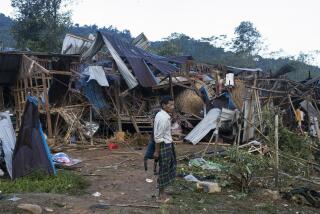Yemen offers cease-fire to Shiite rebels
CAIRO AND SANA, YEMEN — Yemen called for a cease-fire Saturday with Shiite Muslim rebels in its northwest mountains, where tens of thousands of refugees have fled in recent weeks and international humanitarian organizations have condemned rising civilian casualties.
The rebels rejected a similar government cease-fire several weeks ago, and accusations quickly emerged that both sides were violating the truce.
International alarm over the fighting, the latest spasm in a five-year insurgency, deepened Thursday when Yemeni airstrikes purportedly killed 87 people, many of them women, children and the elderly. The United Nations has demanded an investigation of the deaths. Closed roads and heavy fighting have limited access by humanitarian agencies.
The revolt, led by Shiite militant Abdul Malik Houthi, began in 2004 in the Saada mountains along the border with Saudi Arabia. Fighting has since spread to neighboring Amran province and is reportedly creeping closer to Sana, the Yemeni capital.
The conflict has fueled suspicions across the Arabian peninsula. The government of Yemeni President Ali Abdullah Saleh has insinuated that Shiite-led Iran is supporting the rebels with money and weapons. Such a prospect worries the Sunni Muslim government of Saudi Arabia, which has grown concerned over what it considers Iran’s attempts to stoke unrest in the Arab world.
The Yemeni government said the cease-fire was offered to honor Eid al-Fitr, the holiday marking the end of the Muslim fasting month of Ramadan. The government said in a statement that its overture was “in response to all appeals of Saada-based citizens and international relief organizations, particularly an appeal of the U.N. secretary-general, to secure access to displaced people and the war-affected areas.”
Terms of the government’s cease-fire stipulate that rebels withdraw from Saada province, disband checkpoints, return seized government weapons and release prisoners.
News reports quoted rebel spokesman Mohammed Abdel-Salem as saying, “We welcome the cease-fire offer. We have been seeking an unconditional cease-fire deal for a long time. As for the terms, they should be discussed in a dialogue at a negotiating table.”
Nearly 150,000 people have fled their homes over the last five years. The rebels say they are a persecuted minority and want a return to the clerical rule abolished in 1962. President Saleh is a Zaidi Shiite, as are the rebels, but the insurgents say his government is growing too close to Sunni leaders in Yemen and across the Middle East.
--
Edwards is a special correspondent.
More to Read
Sign up for Essential California
The most important California stories and recommendations in your inbox every morning.
You may occasionally receive promotional content from the Los Angeles Times.











